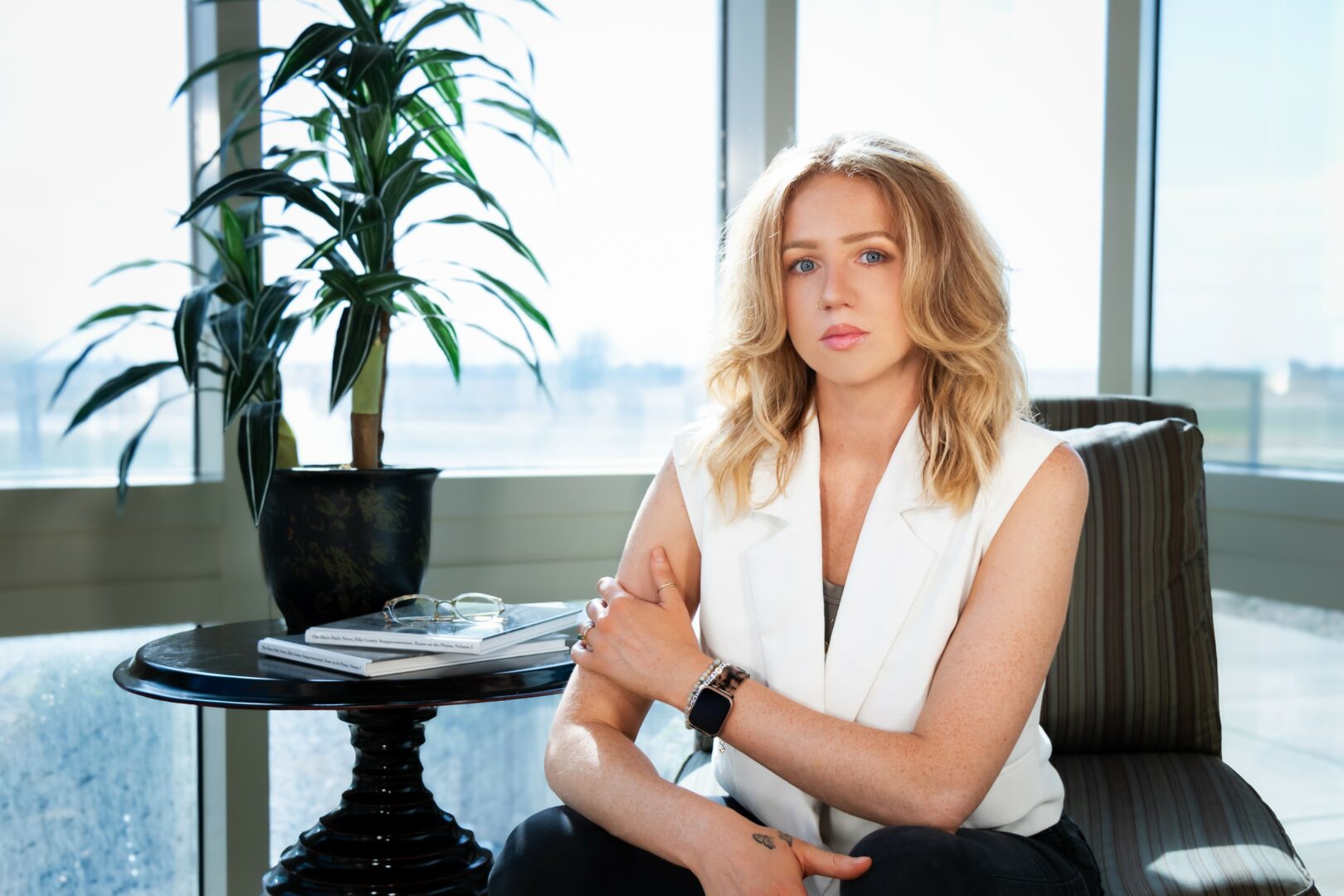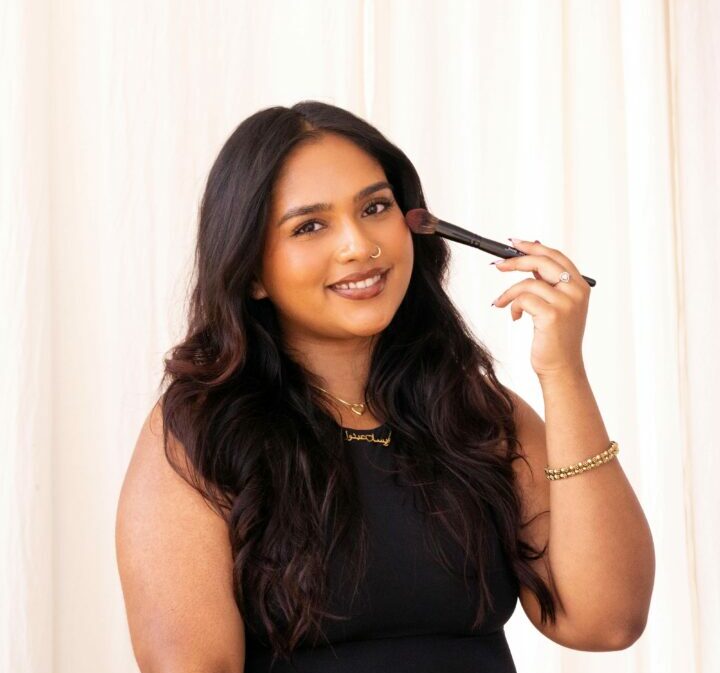Alright – so today we’ve got the honor of introducing you to Lydia McKee. We think you’ll enjoy our conversation, we’ve shared it below.
Hi Lydia, thank you so much for making time for us today. Let’s jump right into a question so many in our community are looking for answers to – how to overcome creativity blocks, writer’s block, etc. We’d love to hear your thoughts or any advice you might have.
I love this question because I was just recently in my studio one night, really going through the motions, feeling super annoyed, getting very worked up, and stressing over this abstract painting I’d been working on for some time. I couldn’t figure out the composition of the piece, and I just felt the colors weren’t right; it was all muddy, and I didn’t feel inspired by my work at all. Normally in this instance, I would put my paintbrushes down and turn to one of my more meditative techniques to tackle the issue, but this time I thought, “let’s just embrace this blockage and try something new. It can be an experiment and no one has to see it.” I took the biggest brush I could find and began to make huge gestural marks across the canvas, a technique I’d never tried before. The piece is now one of my favorite paintings to date. It’s called ‘Artist block.’
It’s interesting because I go through periods of time in my studio practice where I feel like I’ve forgotten how to paint or what it is that I should paint. It’s so frustrating at the time, and you begin to wonder how long it’ll last. For me, a creative block can appear one morning and last a couple of hours or even worse, a couple of weeks! It doesn’t mean the work I’m producing during the ‘creative block’ time is bad, per se, it’s just that my thoughts are not aligning with the physical results, and that itself can feel like such a nuisance. I do different things to tackle the issue, like inspiration hunting. I go on long solo walks and focus on paying attention to the small details of my surroundings, or I’ll take my sketchbook outside and jot down some thoughts and draw some scribbles. I find that anything meditative can help the creative process as a sort of reset.
Great, so let’s take a few minutes and cover your story. What should folks know about you and what you do?
I work full time as an artist and creative from my studio in West Hollywood, California. I’m originally from London, England, but LA is my home now. What I love about my artistic practice is that it’s multidisciplinary. At the moment, I’m very focused on my abstract paintings, although I still make time to work on other projects such as digital illustrations, client commissions, and developing my cartoon work. I think the constant rotation of artistic disciplines and revisiting certain areas of my artistic career helps keep me sane.
I’m currently working on a new body of work that I’m excited about. A series of large-scale paintings featuring various colors, layers, textures, washes, and movement. Color and technique always play an important role in my work because I have to start by feeling inspired by the pigments; otherwise, it’s hard to get into the right painting mindset and portray certain emotions and expressions—or at least, that’s how I see it in my eyes. I want this new series of paintings to feel like moments of escape from the world and simultaneously, a world I’d like to live in. I’m very attracted to the small, peaceful details of life and the moments that may go unnoticed. Similarly, in my art, I find that my paintings are most successful when I can move my eyes around the canvas and constantly find new details and areas to uncover.
Looking back, what do you think were the three qualities, skills, or areas of knowledge that were most impactful in your journey? What advice do you have for folks who are early in their journey in terms of how they can best develop or improve on these?
Recently, I’ve been making an effort to unlearn the practice of planning my work. For years, especially in art school, I’ve been taught to plan my paintings. Now, I’ve found that when I don’t know what the future of my work looks like, I can replace it with trust. I trust my artistic instinct and decision-making. When you invest so much time and energy into the planning of a painting, you feel like you can’t change your mind or steer away when things go wrong. Now, my art is free, spontaneous, and forever evolving. This has been super impactful in my journey.
I also consider myself to be an artist very early in my journey, so I can only offer what I’ve learned in terms of my own art-making process. I say this because I don’t consider myself to have all the knowledge, skill, or advice and am still constantly seeking it myself.
All the wisdom you’ve shared today is sincerely appreciated. Before we go, can you tell us about the main challenge you are currently facing?
I think one of the biggest challenges I face with my work is these moments of fear and hesitation in what I create. I understand that as an artist, not everyone will like my work, and I’m okay with that; I get it. Sometimes, I don’t even like my work! I just let it hide in my studio. What’s hard is the mental obstacles that come from the fear of criticism and rejection. I don’t exactly have all the answers on how to overcome the feelings of self-doubt, but I do accept it all as part of the creative process.
Saying that, I’ve always appreciated constructive feedback, and I’ve learnt to differentiate it from unhelpful negativity. I’m always learning to embrace vulnerability and authenticity in my work, and I think it helps to focus on self-validation of my own artistic journey—reminding myself why I create art and of the satisfaction that it brings me personally. When I make art for myself and nobody else, that gives me meaning.
Contact Info:
- Website: https://lydiamckee.com/
- Instagram: https://www.instagram.com/lydiiamckee.art/
- Linkedin: https://www.linkedin.com/in/lydia-mckee-215079193/
- Other: Tik Tok: https://www.tiktok.com/@artlyd












